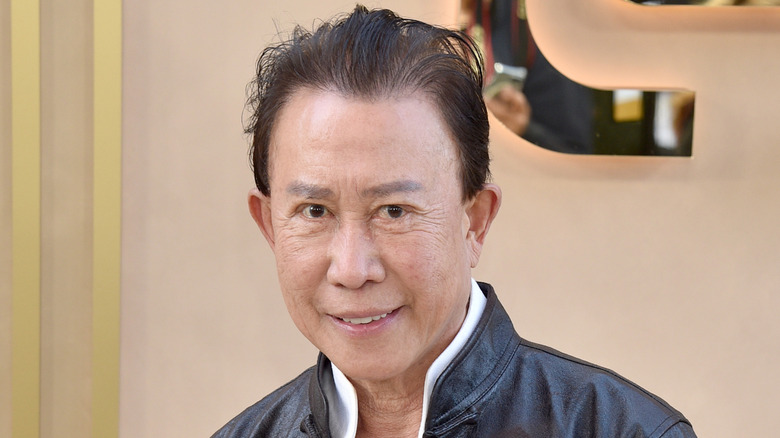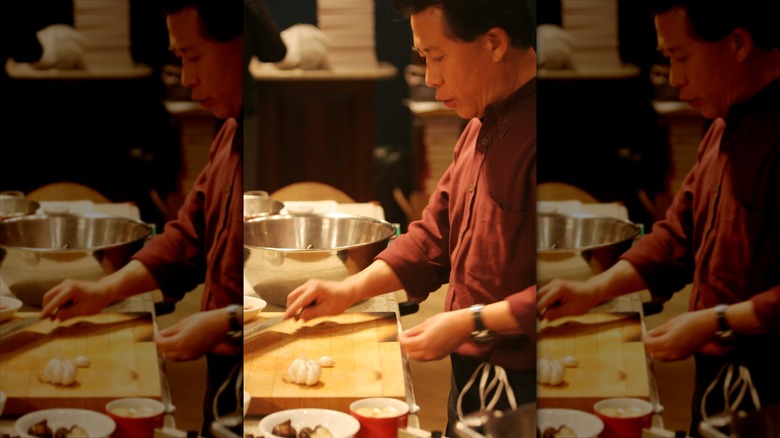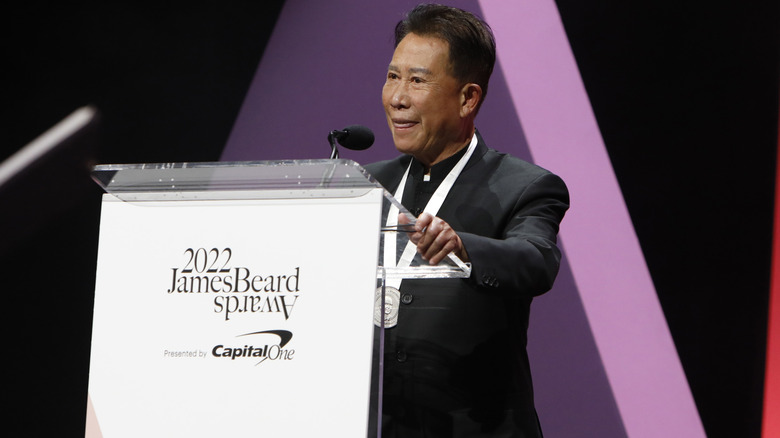The James Beard Awarded Chef Who Hosted The First Ever PBS Chinese Cooking Show
We may receive a commission on purchases made from links.
I don't tune in to Food Network too often these days. I've never been particularly into celebrity chef culture, and I don't really care for competitions. However, when I was growing up, my favorite programs to watch were cooking shows on PBS. Julia Child was must-see television, of course (I was fascinated by her accent), but my sister and I really loved "Yan Can Cook." What we didn't know at the time was how groundbreaking the show was. Martin Yan, a native of Guangzhou, China, was hosting the first Chinese cooking show — in fact, the first Asian cooking show of any kind — ever to appear on PBS. Back in the day, PBS had just about the only cooking content on American television.
"Yan Can Cook" first aired in 1982 on San Francisco's KQED, a PBS member station, although it had an earlier 520-episode run on the Canadian television channel CFAC-TV under the name "Yan Can." Even after filming 3,500 episodes of "Yan Can Cook," creating numerous special television programs, and writing many cookbooks, Martin Yan just keeps on going and going like the Energizer Bunny. As of 2025, he is still traveling around the world, not only filming shows but also supporting charitable causes.
In 2022, he even won a James Beard Foundation Lifetime Achievement Award. Typical for Yan — a humble and cheerful man who seems to truly appreciate every opportunity he has had — he dedicated his award to all the hardworking Asian chefs who will likely never be recognized for their efforts but who nonetheless continue to produce amazing food day after day.
Martin Yan is the antithesis of a celebrity chef
Perhaps what appealed to me most about "Yan Can Cook" was the host's attitude, exemplified by the motto, "If Yan can cook, so can you." Martin Yan genuinely seemed to believe that Chinese cooking was not out of the reach of any home cook, and he never insisted on fancy equipment or exclusive ingredients. He appeared to be well aware that most of his viewers in the early '80s wouldn't necessarily have access to well-stocked Asian grocery stores, so he always suggested substitutes for ingredients that might be difficult to find.
Yan is relatively unsung compared to today's celebrity chefs, which is a shame since it's hard to picture him endorsing pricey brands of butter like Ina Garten or criticizing anyone who prefers pineapple pizza a la Gordon Ramsay. Judgmental he isn't, nor is he all that concerned about his status. In fact, he doesn't seem the slightest bit envious about the fact that Julia Child, a television chef from the same PBS era, is far more famous than he'll ever be. In fact, he saw Child as an inspiration, and the two chefs were friends. In fact, he used to take her out for dim sum. (Chinese food, not French, was Child's absolute favorite international cuisine, although she never tried to cook it.)
Martin Yan's lengthy cooking career
As a boy, Martin Yan and his family struggled with hunger during the Great Leap Forward Famine. At the age of 13, he relocated to Hong Kong to take a job in his uncle's restaurant. After facing near-starvation, the move was life-sustaining, but it also deepened his passion for food. He received a degree from Hong Kong's Overseas Institute of Cookery, studied further in Canada, and later received a food science master's degree from the University of California, Davis.
Yan's appearance on television happened by chance. He was in Calgary, Canada, to help out a friend who was opening a restaurant. He ended up filling in for a sick chef on a local cooking show, which led to "Yan Can" and later, "Yan Can Cook." His first television show concept was just the beginning, though, as Yan followed up with programs such as "My Chinatown," "Spice Kingdom," and "Taste of Malaysia." He has also authored 30 cookbooks, including "Chinese Cooking for Dummies," "The Yan Can Cook Book," "The Joy of Wokking," and "Martin Yan's Chinatown Cooking." The last-named book even has an introduction by his old dim sum buddy, Julia Child.
In addition to television and authorial pursuits, Yan has taught at institutions including the Chinese Cuisine Institute in Hong Kong, the Culinary Institute of America, Johnson & Wales University, and the University of San Francisco. He has also opened (and closed) a few restaurants, including Los Angeles' SensAsian and San Francisco's M.Y. China. Even with all these achievements under his belt, Yan was never doing it for fame and fortune. As he told Asia News Network in 2024, "Basically, if people respect me, that means they respect Asia. So I want to make Asians proud. That is my lifelong mission."


